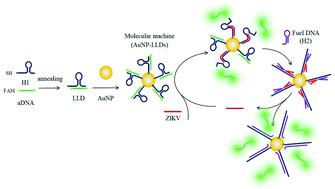A target-mediated fuel-initiated molecular machine for high-sensitive fluorescence assay of the ZIKV gene via strand displacement reaction-based signal recovery and cycling amplification†
Abstract
Zika virus (ZIKV) is a serious threat to human health due to its widespread human arboviral infections, and early diagnosis is one of the keys to preventing infections from spreading, but there is a lack of highly sensitive and specific detection. In this work, a target-mediated fuel-initiated molecular machine was proposed for the high-sensitive fluorescence assay of the ZIKV gene via strand displacement reaction-based signal recovery and cycling amplification. The molecular machine was prepared by modifying AuNP surfaces with specially designed lock-like DNAs (LLDs). The LLDs assembled with a hairpin DNA (H1) and a fluorescent aDNA can be opened under the trigger of the ZIKV gene and the strand displacement reactions are further initiated with the help of the DNA fuel (H2), which results in the release of the aDNAs and ZIKV genes from the AuNPs, causing the recovery of the fluorescence signal and the cyclic amplification of the gene. The target-mediated fuel-initiated molecular machines output an amplified fluorescence signal with the enhancement of 360%, and possess good sensitivity for detecting the ZIKV gene in serum with a linear calibration curve from 100 pM to 1 fM and a low limit of detection of 0.90 fM. The molecular machines can differentiate the ZIKV gene from the single base mismatched DNA obviously and show good recovery of ZIKV gene detection, which demonstrates the good specificity, reproducibility and reliability of the highly sensitive assay for the early detection of the virus.



 Please wait while we load your content...
Please wait while we load your content...